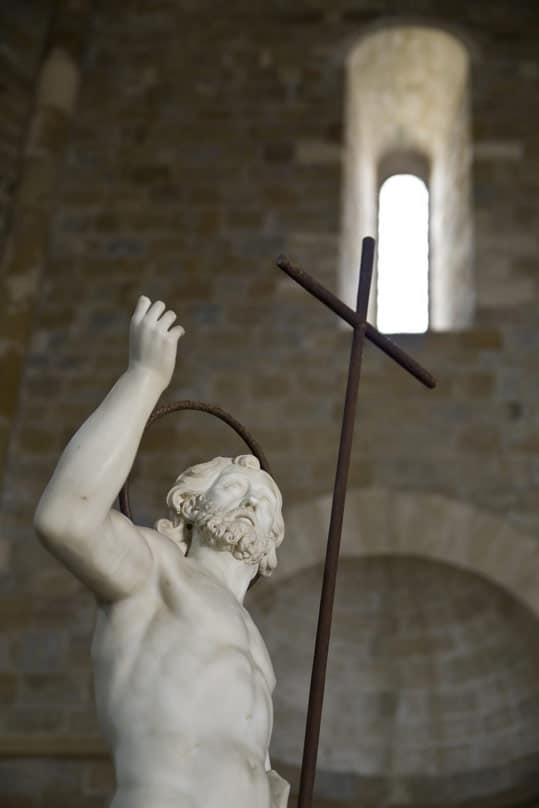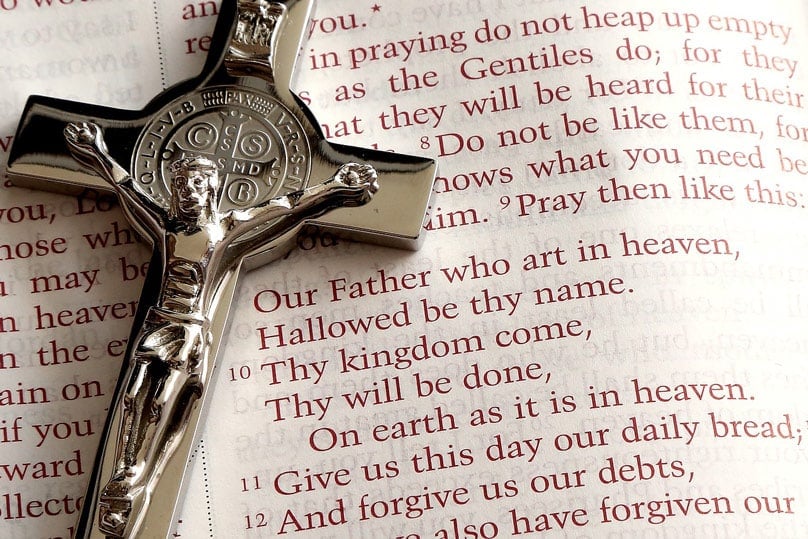Because of our tendency to rip truth out of the weave of revelation or wrongly order those truths, one of the functions of the Creed is to help us rightly order our knowledge of God. Jesus’ ultimate revelation about the first Person of the Trinity is that God is not a mere abstract Ground of Being. Nor is God merely Master, Lord, King, Author of Creation, or Ruler of Time and Space (all “power” titles). No, for Jesus he is “my Father and your Father” (John 20:17). All these other titles have their place. But the supreme revelation remains that God is Father.
For many postmoderns this immediately creates a difficulty. Isn’t it unfair that God should be depicted with masculine imagery in the Bible? Doesn’t Scripture pretty much claim that God is male?
Actually, no. The Bible makes it exceedingly clear that God is neither male nor female; He is Spirit. Remember: it is paganism—not the Catholic faith or the Bible—that sees God as simply an expansion on whatever bit of nature we happen to fancy. In contrast, the Catholic faith sees nature as a dim reflection of a God who is utterly transcendent. Because of this, God is the source of both masculinity and femininity. While God is neither male nor female, both masculinity and femininity reflect attributes of God. For this reason, the book of Genesis describes the creation of human beings this way: “So God created man in his own image, in the image of God he created him; male and female he created them” (Genesis 1:27).
The full image of God is not simply man but man and woman together. Of course, God is, in himself, beyond the distinctions of human gender. We refer to God as “Him” rather than “It” because God is personal (in fact, super-personal since he is three Persons, the Trinity); he is not some impersonal ‘force’ or ‘energy’.
Then why, it may be asked, does Christianity constantly address God in masculine terms as “Father,” “Lord,” and so forth?

Precisely because Jesus has revealed himself in this way. It was, after all, Jesus who taught “When you pray, say: ‘Father’” (Luke 11:2). God reveals himself as “Father” because this best describes his relationship with Jesus, his Son, and with us. This, of course, does not mean “men are superior to women.” In terms of dignity, male and female are absolutely equal. As Paul states, in Christ Jesus, “There is neither Jew nor Greek, there is neither slave nor free, there is neither male nor female; for you are all one in Christ Jesus” (Galatians 3:28).
The next thing to note is that the Creed states that God is Father before it mentions what would have been taken for granted by any ancient monotheist: that God is Almighty. That’s because the Fatherhood of God explains what we overlook in our rush to think of him in his omnipotence. For us, omnipotence is often understood to mean that God is bound to take the path of least pain and is especially bound to see that we avoid it too. That is what drives the first of the only two reasonable objections to the existence of God St. Thomas can find in the whole history of human thought. All others are either variations (or combinations of) these two objections or else they are fallacies. The objection is, “Bad things happen. If God is good and almighty, they shouldn’t. So there’s no God.” Or as Thomas put it:
It seems that God does not exist, because if one of two contraries be infinite, the other would be altogether destroyed. But the word “God” means that He is infinite goodness. If, therefore, God existed, there would be no evil discoverable; but there is evil in the world. Therefore God does not exist.
If God is Almighty, we assume, he can just sweep away all evil with a wave of his hand, right? We read Psalm 91:1-2 (“He who dwells in the shelter of the Most High,/who abides in the shadow of the Almighty, will say to the Lord, “My refuge and my fortress;/my God, in whom I trust.”) and reflexively hear it saying, “If you are right with God, he won’t let anything bad happen to you.” Indeed, in this very psalm are the verses the devil tried to use to tempt Jesus to leap off the temple (with the implication that if God would not save him from pain, he’s not much of a Beloved Son and God is not much of a God (cf. Matthew 4:5-6)).
Jesus rejected this lie. He knew that the might of God was not displayed by never suffering, but by passing through the agony of the cross instead of around it so that everything–even evil–would give God glory in the end. As Paul put it:
Have this mind among yourselves, which was in Christ Jesus, who, though he was in the form of God, did not count equality with God a thing to be grasped, but emptied himself, taking the form of a servant, being born in the likeness of men. And being found in human form he humbled himself and became obedient unto death, even death on a cross. Therefore God has highly exalted him and bestowed on him the name which is above every name, that at the name of Jesus every knee should bow, in heaven and on earth and under the earth, and every tongue confess that Jesus Christ is Lord, to the glory of God the Father. (Philippians 2:5-11)
That is the key insight of this line of the Creed. Because God is Father–the Father from whom all fatherhood on earth takes its name (Ephesians 3:14)–his Omnipotence is spent, not in crushing his enemies by force, nor in never having to face evil, but in turning even the shattering blows against him into happiness even for his enemies and glory for himself.
Which brings us to our final point about this line of the Creed, next time.

